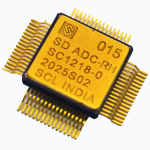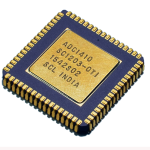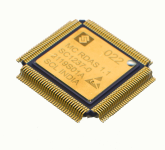Tata continues to make India proud and strong. Salute.
Indian semiconductor ecosystem: News, Updates & Discussions.
- Thread starter Ashwin
- Start date
You are using an out of date browser. It may not display this or other websites correctly.
You should upgrade or use an alternative browser.
You should upgrade or use an alternative browser.

Semiconductors likely in for another massive boost as India tries to make up for lost time in chipmaking
The 76,000-crore incentive package was launched in December 2021 to support companies making semiconductors and investing in them. That amount has been nearly exhausted, necessitating a fresh boost for India's big chip plan. And indications are that the coming plan will likely be much bigger in...
Tata Electronics Ltd has initiated the export of a limited quantity of semiconductor chips packaged at a pilot line situated in its research and development centre in Bengaluru, according to a report in The Economic Times (ET).
The packaged chips are being sent to Tata Electronics' partners in Japan, the US, and Europe, the report claimed, citing sources.
Tata Electronics is also in advanced stages of finalising the tape-out process for semiconductor chips ranging from 28 to 65 nanometres, along with some higher nodes, the report added. Notably, the chips currently being exported are versatile and not tailored for specific applications.
Lam Research expanding Semiconductor Fabrication Equipment supply chain ecosystem in India
by Nidhi Singal for Business Today

Fueling India’s ambition of creating a 360-degree ecosystem for semiconductor manufacturing, including the establishment of Semiconductor Wafer Fab Equipment (WEF) manufacturing, Lam Research is expanding its global semiconductor fabrication equipment supply chain to India. The US-headquartered Lam Research designs and builds products for semiconductor manufacturing.
Earlier, Business Today reported on the Ministry of Electronics and IT's pursuit of developing a downstream ecosystem—industries that utilize the output to manufacture finished products, including equipment manufacturing.
Ashwini Vaishnaw, Minister of Electronics & IT, had previously informed Business Today that having manufacturers of wafer fabrication equipment (WFE) is an integral part of the India Semiconductor Mission, and his ministry is open to introducing a scheme like SPECS or the Scheme for Promotion of Manufacturing of Electronic Components and Semiconductors.
Now, Lam Research is assessing capabilities across various supply chain segments and exploring India-based suppliers who can collaborate to fulfill the need for precision components, custom parts, high purity gas delivery systems, and other assemblies required for cutting-edge semiconductor wafer fabrication equipment. The company's "close to customer" strategy drives collaboration with thousands of suppliers worldwide, enhancing resilience against region-specific supply chain issues and preventing bottlenecks.
"We are proud to be expanding our supply chain in India," said Rangesh Raghavan, corporate vice president, and general manager at Lam Research India. "By enhancing Lam’s strong global supply infrastructure with capabilities from local suppliers, integrators, and other strategic providers, we aim to enhance the flexibility of our supply chain while further supporting the semiconductor ecosystem in India, where Lam has been a proud leader for more than two decades."
Previously, Danish Faruqui, CEO of Fab Economics, had informed Business Today that India’s proactive inclusion of Semiconductor WFE Manufacturing as part of India’s semiconductor decadal roadmap is not only existential for the domestic semiconductor ecosystem but also a masterstroke by India based on global geopolitics and geoeconomics of semiconductors.
He stated, "Many across the world have cited India’s foray into semiconductors as a copy approach to China and described it as 'China – 30 years back,' but with the recent announcement, India has taken a completely different approach from China and applied learnings from China’s cardinal mistake in setting up a domestic semiconductor ecosystem."
Lam Research expanding Semiconductor Fabrication Equipment supply chain ecosystem in India
Earlier, Business Today reported on the Ministry of Electronics and IT's pursuit of developing a downstream ecosystem—industries that utilize the output to manufacture finished products, including equipment manufacturing.
India's Zoho plans $700 mln foray into chipmaking
By Munsif Vengattil
May 16, 20243:11 PM GMT+5:30Updated 9 hours ago

The logo of Indian multinational technology company Zoho is displayed at the Collision conference in Toronto, Ontario, Canada June 23, 2022. Picture taken June 23, 2022. REUTERS/Chris Helgren/File Photo Purchase Licensing Rights
NEW DELHI, May 16 (Reuters) - Indian software firm Zoho is planning a foray into chipmaking and seeking incentives from the federal government, two sources with direct knowledge of the proposal said, with one of them pegging the investment plan at $700 million.
Zoho, established in 1996 and now headquartered in India's Tamil Nadu, offers software and related services on subscription to businesses in 150 countries, competing with the likes of Microsoft and Salesforce.
It is the latest company to seek financial sweeteners from the government to set up a chip fabrication plant.
Semiconductors are a key plank of India's business agenda, with a $10 billion package in place to boost the industry as it hopes to compete with countries such as Taiwan in a few years.
Zoho is proposing to manufacture compound semiconductors, which have specialized commercial applications and are made from alternatives to the more-commonly used silicon in chipmaking, the two sources said.
The proposal is being reviewed by the panel that drives India's chip initiatives at the IT ministry, they added. The ministry has sought more clarity from Zoho on the customers it intends to do business with, the second source said.
Zoho declined to comment, while the IT ministry did not immediately respond to a request.
The first source, who said the company had estimated an investment outlay of $700 million, said Zoho had also identified a tech partner to help set up the operation from scratch, without naming the firm.
In March, founder and CEO Sridhar Vembu said Zoho was planning a chip design project in the southern state of Tamil Nadu, without providing further details. Its plans to diversify into chip manufacturing have not previously been reported.
Zoho made annual revenue of over $1 billion in the financial year ended March 2023, according to media reports.
In February, India gave the go-ahead to construction of three semiconductor plants worth over $15 billion by firms including Tata Group and CG Power, with plans to manufacture and package chips for sectors including defence, automobiles and telecommunication.
India has estimated its semiconductor market will be worth $63 billion by 2026.
https://www.reuters.com/technology/indias-zoho-plans-700-mln-foray-into-chipmaking-2024-05-16/
Bodhi Computing Acquisition Signals Ola’s Shift to RISC-V to Make Chips for Krutrim AI Cloud
Ola will leverage Tenstorrent’s expertise in RISC-V and chip designing to develop its own chips to power its AI cloud infrastructure and other requirements.
Published on May 15, 2024
by Pritam Bordoloi

After entering the AI space with Krutrim AI, Bhavish Aggarwal, the CEO of Ola Cabs, has now ventured into the AI cloud space.
With Krutrim Cloud, Aggarwal wants to provide Indian developers with sophisticated AI computing infrastructure, as well as access to Krutrim AI models and a range of open-source models.
This initiative resembles a marketplace concept akin to the one being developed by Tata Communications. While Tata is building its AI Cloud with NVIDIA, Aggarwal is batting for Make in India. He wants to design and build the chips that power his AI Cloud locally.
While this might seem outrageously ambitious, Aggarwal has already taken the first step. Last year, he quietly acquired Bodhi Computing, a startup which builds and sells server-grade systems.
Bhavish Aggarwal wants to make everything in India
Sambit Sahu and Raguraman Barathalwar, both industry veterans with experience at companies like Intel, founded Bodhi Computing.
While the deal’s financial details are not known, interestingly, the Bengaluru-based company was founded in March 2023 and was acquired by Ola just a few months later.
Bodhi Computing was recently in the news for partnering with Toronto-based AI chip company Tenstorrent. In an interview with AIM, Tenstorrent COO Keith Witek said that he made an arrangement with Bodhi to be bought by Ola.
“Bodhi Computing is now at Ola; they’ve even scaled up operations beyond what we were able to scale. Ola is developing very advanced RISC-V and AI solutions for data centres and transportation and we’re partnering to make sure that it happens,” Witek said.
Recently, Tenstorrent also partnered with the Centre for Development of Advanced Computing (C-DAC) to help them build supercomputers, high-performance computing (HPC) systems, and data centre-grade products.
“We’ll licence the technology, offer assistance with training and development, and collaborate on creating any necessary technology or adaptations to ensure their success,” he added.
Betting on RISC-V for designing chips locally
In recent times, the popularity of RISC-V, an open-source instruction set architecture utilized for crafting custom processors, has surged. It presents an alternative to ARM and Intel, both of which have their own limitations stemming from their proprietary nature.
In April 2022, the Indian government initiated the Digital RISC-V programme (DIR-V), which aims to foster the development of next-generation microprocessors in India and positions the nation as a prominent global hub for RISC-V expertise.
Ola will leverage Tenstorrent’s expertise in RISC-V and chip designing to develop its own chips to power its AI cloud infrastructure and other requirements. Similar to C-DAC, Tenstorrent will also licence its technology to Ola, provide support and ensure its adoption.
Aggarwal has publicly expressed his desire to design chips locally on multiple occasions last year. Furthermore, India’s efforts to foster local semiconductor production are in harmony with his strategy.
Developments beyond AI
Now that Aggarwal is also building AI models and cloud infrastructure, its chips could also power its electric vehicles—both two-wheelers and four-wheelers.
Ola Electric is already a leader in India’s two-wheeler EV scooter market. The company is also developing four-wheeler EVs and could launch them this year.
Although little information is available about Ola’s four-wheeler, the company announced last year that it will provide a range of over 500 km per charge. Aggarwal claimed it would be the “sportiest car ever built in India”.
Ola’s entry into the four-wheeler EV segment could put the company in direct competition with Tesla and BYD. While Tesla could enter the market in the coming months, BYD, one of the largest EV makers in the world, is aggressively expanding in India.
Moreover, Aggarwal could be spreading his wings even further. On April 1, Aggarwal unveiled an autonomous scooter on social media. Even though it was meant for laughs, Aggarwal claimed in a social media post that his team is already working on autonomous technology for two-wheelers.
Given the secretive nature of his projects, there is a possibility Ola could also be working on autonomous technology for four-wheelers as well.
Bodhi Computing Acquisition Signals Ola's Shift to RISC-V to Make Chips for Krutrim AI Cloud
Interesting never knew there were pvt Indian companies in material research. will Indian govt fight globally for protecting Indian companies IP ?
will Indian govt fight globally for protecting Indian companies IP ?

When have they ever done that?
Looks like you were beaten to it anyway:

 www.technologynetworks.com
www.technologynetworks.com
Researchers Create World’s First Functional Semiconductor Made From Graphene
Researchers have unveiled the world’s first functional semiconductor made from graphene. The team says that their discovery could lead to the development of smaller and faster electronic devices.
can they mass produce it commercially ? until then all those break throughs will simply remain in academic domain.Looks like you were beaten to it anyway:

Researchers Create World’s First Functional Semiconductor Made From Graphene
Researchers have unveiled the world’s first functional semiconductor made from graphene. The team says that their discovery could lead to the development of smaller and faster electronic devices.www.technologynetworks.com
IP is IP whatever domain it's in, but you were still beaten either way:can they mass produce it commercially ? until then all those break throughs will simply remain in academic domain.
Issuer Services | London Stock Exchange
Look on the bright side, you won't have to worry about protecting your IP now anyway.

very smart move, need to target lower end of value chain first. Even though it is crowded at the bottom , they can capture local market based on price & logistic efficiency. If we can replace all the peripherals & interconnect system devices in another 5 years that will be a great achievement.
L&T Semiconductor Technologies to acquire SiliConch Systems for Rs 183 crore
Read more at:
L&T Semiconductor Technologies to acquire SiliConch Systems for Rs 183 crore - ET Telecom
Read more at:
L&T Semiconductor Technologies to acquire SiliConch Systems for Rs 183 crore - ET Telecom
difference between India vs china is leadership, chinese do a fantastic job of harnessing their human & financial resources, display excellent planning & implementation discipline. Successive Indian govts have failed terribly, they are reduced to begging for investment & technology all the time.














